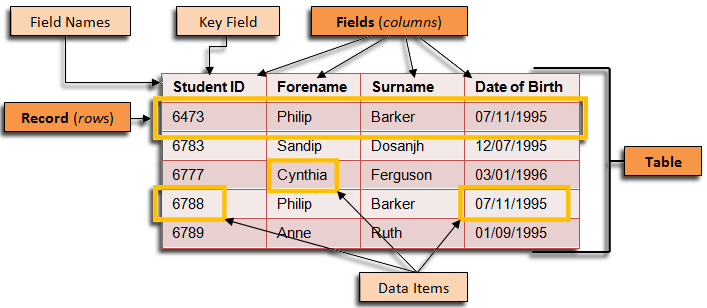We’ll get started at 5 past
Week04
COMP6443
Upcoming due dates?
Next Week
- During the lecture slot mid-sem (0%)
- Challenges
- Report 1 is out (not due)
SQL SQUILLY
Structured Query Language
- Basically how you can find stuff in a database.
Some examples of “Flavours” (different implementations of SQL) include
- SQLite, PostgreSQL, MySQL, MSSQL Server
Databases
- Tables
- Defined through columns
- Contain records
- each record potentially containing a value for every cell.

How do I use SQL? Well you just “QUERY” for what you want!
Queries
SELECT <column> FROM <table>;-> Returns all the values of “column” in the table.INSERT INTO table (columna, columnb) VALUES (a, b);-> Inserts some values into a table.UPDATE table SET ... = ...-> Updates values of a table.DELETE FROM table ...-- a comment (also #)-> Anything after the – is ignored.
SELECT * FROM table WHERE … -> Select ALL THE COLUMNS from a table
col = ...col > ...col < ...col <> ... #not equals (!=)col LIKE ... #regexp_(.)and%(.*)are wildcards
SOME EXTRA COOL STUFF YOU CAN SELECT (WRITE THIS DOWN)
Fingerprinting (What flavour am I using?)
- work out the flavour/version
- MySQL:
SELECT Version() - SQLite:
SELECT sqlite_version() - MSSQL:
SELECT @@Version
- MySQL:
Finding the schema
- what tables exist, what do they look like?
- MySQL:
SELECT * FROM information_schema.[tables|columns] - SQLite:
SELECT * FROM sqlite_[master|schema] - MSSQL:
SHOW TABLES; DESCRIBE <table_name>
- MySQL:
Demo this using
Demo SQL Code
SELECT * FROM sqlite_master
INSERT INTO users VALUES (5,'jesse','merhi')
SELECT * FROM users UNION SELECT * FROM stock
Notes on UNIONs
- The query needs to extract the same number of columns from both tables
- The data-type for the columns must be compatible
- You can also UNION the same table
SELECT username, password FROM users UNION SELECT * FROM stock
SQLi (Squilly for cool kids)
SQL Injection
TLDR: blindly trusting user input is bad
What if we injected control characters which changed how the database interprets the query? e.g. inject our own
UNIONS/WHERES/etcHow could it tell the difference?
How does SQLi work
SELECT * FROM users WHERE user = '{input}' AND password = '{...}'
If our input was: ' OR 1=1 --
-- vvvvvvvvvvvvvvvvvvvv
SELECT * FROM users WHERE user = '' OR 1=1 --'and password = '...'
-- ^^^^^^^^^^^^^^^^^^^^
-- user = '' is always false, but 1=1 is always true
-- so this will return every user from the database
Issues you may encounter
- Syntax needs to be correct, or you’ll throw an error
- so, determine syntax through errors/fingerprint
Common syntax errors:
- Single vs. Double quotes
- Commenting character (–) vs #
- Brackets!
((username = '{INPUT}' AND password = '{PASSWORD}'))
- You have SQLi in
items, but wantusers- find out the tables? (database schema)
- include that table with a
UNION
SELECT * FROM items WHERE item = '' UNION SELECT username,password FROM users;--;'
-- ^^^^^^^^^^^^^^^^^^^^^^^^^^^^^^^^^^^^^^^^^^^^^^
SQLi Demo
Back to /login
Mitigations
Defense
- Reduce information disclosure
- Don’t display error messages
- Just fail or show a basic error message (e.g.
'username or password incorrect')
- Strip out malicious content (e.g. use a WAF)
- Block requests with anything sus (kinda bad UX)
Better defence
- Don’t use raw content
- Use parameterised queries rather than raw input
- use an ORM (database as an object)
Note: these have historically still been vulnerable, don’t solely rely on them
Offense
- Content stripped?
- embed dummy characters (oORr)
- use alternating case (WhErE)
- No response?
- Timing Attacks (IF success THEN sleep(1))
- Error-based extraction (get the output in an error)
- Boolean-based extraction (IF success THEN …)
NoSQL (MongoDB)
- it’s not sql so therefore no sqli right?
- yes but not yes
- it’s still vulnerable to injection
- not necessarily in the challenges
covered in the extended lecture
Now you
- give the topic3 challenges a shot :)
- get your report ready!!